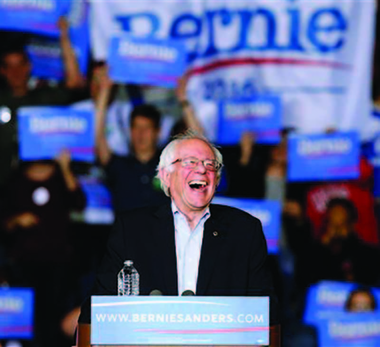Seeking to regain traction, Sanders plans new policy push

WASHINGTON (AP) — Vermont independent Sen. Bernie Sanders is preparing an aggressive push to regain ground in the race for the Democratic presidential nomination, combining a series of ads, policy speeches and appearances before key groups of voters in a bid to ignite his challenge to front-runner Hillary Rodham Clinton.
Much of his effort will focus on attracting minority supporters, starting this weekend with events with black voters in South Carolina and Hispanics in Nevada. Up next are a series of speeches designed to answer questions about where he would take the nation as president.
A wild card remains in how Sanders chooses to address Clinton's use of a private email system while serving as secretary of state. After seeming to set aside the issue of what he described as her "damn emails" in the first Democratic debate, he appeared to reopen the saga in an interview with The Wall Street Journal on Wednesday, saying there are "valid questions" about her correspondence.
That prompted a sharp response from the Clinton campaign, with spokesman Josh Schwerin accusing Sanders and his strategists of engaging "in the type of personal attacks that they previously said he wouldn't do."
Tad Devine, Sanders' chief political strategist, pushed back against the notion that Sanders had shifted his approach.
"Bernie's never gone there and I don't see us going there in the campaign unless it gets incredibly nasty and they make outrageous accusations about him," Devine said. "I hope that doesn't happen."
The exchange underscores the central challenge for Sanders as he attempts to boost his support ahead of the Iowa caucuses, now roughly three months away — how to draw distinctions with Clinton without violating his pledge to avoid character attacks.
His speech last month in Iowa during the party dinner included a series of sharp contrasts with Clinton on issues important to the Democratic base, such as the Keystone XL pipeline, the Trans-Pacific Partnership trade deal, gaymarriage and the Iraq war.
In an interview with The Associated Press on Wednesday, a day after Clinton reinforced her support for a $12 minimum wage, Sanders said the next president must press for more.
"The goal has got to be over the next few years no worker earns less than $15 an hour," Sanders said.
Sanders' campaign is considering a speech, possibly in New York, to provide more details on his economic policies, including how he would seek to structure tax rates to pay for his domestic policy agenda and seek to regulate Wall Street. Other topics he plans to address are how he would serve as commander-in-chief and a domestic policy agenda that will include proposals on family and medical leave, a Medicare-for-all health care system and an expansion of Social Security benefits.
Sanders is already airing his first television ad of the campaign in Iowa and New Hampshire, pumping $2 million into a spot that discusses his political activism as a college student, his work as the mayor of Burlington, Vermont, and his record in Congress, including his 2002 vote against the Iraq war, which Clinton supported at the time.
Having spent decades representing a largely white and rural state, Sanders recognizes he remains largely unknown to African-American and Latino voters who make up a crucial segment of the Democratic Party. So, his next step will be Spanish-language radio ads in Las Vegas and Reno, Nevada, which tell the story of his father, who immigrated from Poland as a young man. The campaign is also planning radio ads on South Carolina stations popular with black voters, who comprise about half of that state's primary electorate.
Sanders will address black voters during a campaign swing through South Carolina this weekend, joining Clinton and former Maryland Gov. Martin O'Malley at a forum on Friday night hosted by Rep. James Clyburn, a prominent black lawmaker. From there, he'll head to Las Vegas where he'll address an immigrant rights organization.
Though he frequently cites his work as a civil rights activist in the 1960s, Sanders has little personal experience wooing black voters, since he's an elected official from a state that's 95 percent white.
"I'm just not well known in the African-American community," he said in an interview with NPR. "That's just simply the truth."
Clinton, meanwhile, has focused much of her recent campaigning on issues important to minority voters, in an effort to recreate the winning coalition of black, Latino and young voters that twice catapulted President Barack Obama into the White House.
While Clinton has appeared to solidify her support in the party in recent weeks, she is far from locking up the nomination. Many in a focus group of undecided Democratic women — so-called "Walmart moms"— held in Des Moines this week questioned her trustworthiness and loyalty, describing her as "shady," ''shifty" and "sold out."
"They still have objections," said Margie Omero, a Democratic pollster who helped organize the event. "There are some obstacles for her to get past."
Lisa Lerer and Ken Thomas.
Copyright 2015 The Associated Press. All rights reserved. This material may not be published, broadcast, rewritten or redistributed.
The Gayly - 11/6/2015 @ 11:38 a.m. CST





